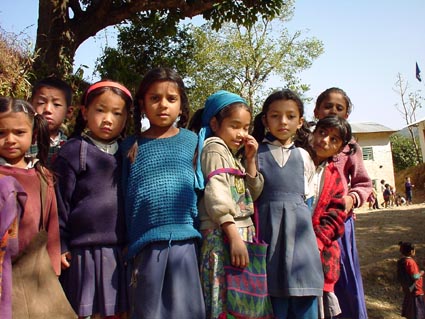![]()
![]()
Introduction 2(to) International Development
.
国際開発入門
.

For the happiness of loving and being loved .....
(at a school in a mountain area of Nepal)
.
2002 Course Syllabus
.
.
.
(April 2002)
Course Manager: Prof. Shigeru Thomas OTSUBO
Thematic Cluster Managers: Prof. S.T. OTSUBO (Globalization and Development), Prof. CHO Du-Sop (Japanese Development Model), Prof. Sanae ITO (Poverty), Prof. Yasunobu SATO (Confilict and Development), Prof. Toru KINOSHITA (Intercultural Understanding and Communication)
Participating Professors: Prof. Mitsuo EZAKI, Prof. Hiroshi OSADA, Prof. Yoshihiko NISHIMURA, Prof. Yutaka OTSUKA, Prof. Aya OKADA (DID); Prof. Hirotsune KIMURA, Prof. Hisae NAKANISHI, Prof. Kimiaki TAKAHASHI, Prof. Atsuko OHASHI, Prof. Takeshi HIGASHIMURA, Prof. Takashi KUBOTA (DICOS); Prof. Naoki CHUJO (DICOM); Prof. Makiko TADOKORO (Foreign Student Advisor); Prof. Masato NODA, Prof. Tsuyoshi OHIRA (Research Associates).
Course Assistant: Prof. Masato NODA (GSID Research Associate)
Lectures: Wednesdays 1:00-3:00 p.m. in the GSID Auditorium (8th floor)
Office Hour: By appointment with respective instructor.
Teaching Assistants: Ms. Rika Nakagawa (D1) and Mr. Surapat Wongpangson (D1)
Classes are conducted in English and Japanese.
Course Description
This GSID-wide common course is provided as an entry point to GSID’s multidisciplinary International Development Studies. In order to demonstrate to incoming students the efficacy and attractiveness of a multidisciplinary approach to International Development, faculty members with various research areas and job experiences have prepared this introductory course using team-teaching methods. This course also introduces human and Internet resources available at GSID to newcomers. The course consists of the following six issue-based clusters (with the name of the cluster manager in parentheses) in the academic year of 2002.
1) Introduction to International Development Studies (Prof. H. Kimura and Prof. S. Otsubo)
2) Globalization and Development (Prof. S.T. Otsubo)
3) Japanese Development Model (Prof. D. Cho)
4) Poverty (Prof. S. Ito)
5) Conflicts and Development (Prof. Y. Sato)
6) Intercultural Understanding and Communication (Prof. T. Kinoshita)
Each cluster consists of presentations by several professors and discussion sessions.
Both English and Japanese (with English summaries) will be used in this course.
研究科共通の本コースは、GSIDにおける学際的な「国際開発学」への入り口として用意されている。「国際開発」が学際的であることの有用性、妙味を新入生に紹介することを目指し、多様な研究領域・職歴を有するGSID教官が、ティームティーチングで臨む入門コース。GSIDの人的リソース、インターネットリソースの紹介を兼ねる。2002年度は、以下の6つのイシュー別クラスターから構成される(括弧内はクラスターマネジャー)。
1) 国際開発学へのいざない (木村宏恒教授、大坪滋教授)
2) グローバリゼーションと開発 (大坪滋教授)
3) 日本型開発モデル (Cho斗燮助教授)
4) 貧困 (伊東早苗助教授)
5) 紛争と開発 (佐藤安信教授)
6) 異文化理解とコミュニケーション (木下徹教授)
各クラスターはそれぞれ複数の教官によるプレゼンテーションと討論会で構成される。 クラスターにより、英語もしくは日本語を主たる使用言語とするが、両言語に配慮する。
Course Schedule: Thematic Clusters and Issues
(Detailed cluster schedule & required readings will be announced in each thematic cluster. Also, pay attention to the Course Bulletin Board on the web.)
|
April 17 |
a) An Introduction to I2ID (Course and Cluster Managers) b) An Introduction to GSID Resources (Course Manager)
c) The Evolution of Development Thought/Paradigm: A Political Scientist's Overview (Prof. Kimura)
d) The Evolution of Development Thought/Paradigm: An Economist's Overview (Prof. Otsubo) ・ The Evoluiton of Development Thought
Required Readings:
・Joseph Stiglitz and Gerald Meier. Frontiers of Development Economics: The Future in Perspective. London: Oxford Univ. Press, 2000.
・Also, visit Prof. Kimura’s Homepage on the GSID Website: www.gsid.nagoya-u.ac.jp/user/prof/p2kimurah/kimura_homepage/
・Mark Turner. Governance, Development and Public Administration. 1997.
|
|
April 24 |
a) Globalization and Economic Development: Opportunities and Challenges (Prof. Ezaki, Prof. Osada, and Prof. Otsubo) b) Global Governance: A Consideration from the Perspective of Political Science (Prof. Kimura) c) Globalization and Local Culture (Prof. Ohashi and Prof. Takahashi)
a) グローバリゼーションと経済開発: 光と影 (江崎教授、長田教授、大坪教授) b) グローバルガバナンス:政治学からの考察 (木村教授) c) グローバリゼーションの波及と地方文化 (大橋助教授、高橋教授)
|
|
May 15 |
a) Japanese System of Economic Development: Success, Stagnation, and Structural Reform (Prof. Otsubo) b) Japanese Management Style? (Prof. Cho) c) Characteristics of Japanese-style Educational Development (Prof. Otsuka) d) The Construction of Japanese Women in the Process of the Development of Japanese-style Capitalism (Prof. Nakanishi)
a) 日本型経済発展システム:成功、沈滞、そして構造改革 (大坪教授) b) 日本的経営ってどんなもの? (Cho助教授) c) 日本型教育開発の特質 (大塚教授) d) 日本型資本主義の発展過程における日本女性の地位形成 (中西教授)
|
|
June 5 |
a) Measurements of Poverty and Strategies for Poverty Reduction: An Overview (Prof. Kimura, Prof. Noda) b) Education and Poverty Reduction (Prof. Okada) c) Rural Poverty (Prof. Nishimura, Prof. Ito)
a) 貧困の測定と貧困緩和政策 (木村教授、野田助手) b) 貧困緩和と教育 (岡田助教授) c) 貧困緩和と農村開発 (西村教授、伊東助教授)
The first meeting (June 5) on 'Poverty' will be held as an Extension Lecture (open to the public) during the Meidai-sai (Nagoya University Festival). It will take a form of the participatory workshop.
|
|
June 26 |
a) Introduction to Conflict and Development (Prof. Sato, Prof. Kodama, and Prof. Ohira) b) Human Security and Peace Building c) Free-market economies and dispute processing: Rule of Law (Prof. Sato, Prof. Kubota) d) Self-autonomous dispute processing: ADR and negotiation studies
a) 総論 (佐藤教授、児玉教授、大平助手) b) 「人間の安全保障」と「平和構築」 c) 市場経済と紛争処理:法の支配 〈佐藤教授、久保田助教授) d) 自律的紛争処理の可能性:ADRと交渉学
|
|
July 10 |
a) Introduction to Intercultural Communication (Prof. Kinoshita) b) Intercultural Contact and Psychology (Prof. Tadokoro) c) Cross-cultural Encounters in Japan: Colonization of Hokkaido, Development and Indigenous People (Prof. Higashimura) d) Cross-cultural Encounters in the Former USSR (Prof. Chujo)
a) 異文化コミュニケーション入門 (木下教授) b) 異文化接触と心理学 (田所講師) c) 日本における異文化接触―北海道の植民地化と開発・先住民族(東村助教授) d) 旧ソ連圏における異文化接触 (中條教授)
|
Textbooks and Readings
[Course Readings]
Refer to the Thematic Cluster Pages (from the Course Schedule Panel).
Designated books can be found in the 'I2ID Course-Book Section' (Restricted Circulation) in the GSID Library.
Also check the 'GSID 105 Recommended Books Section' in the GSID Library where reading materials recommended by the GSID faculty members are collected.
Resources on the Internet
For web sites related to each thematic cluster, refer to the Thematic Cluster Pages (from the Course Schedule Panel).
Also refer to the "Exploration of Economics/Intn’l Development Resources" corner of Prof. Otsubo's Home Page.
Grading Policy
A short note summarizing what you learned in each thematic cluster will be required. You will be requested to provide the faculty a course evaluation at the end. Your attendance will be recorded for each course meeting. Your class participation and contribution will also be important grading factors.
テーマ・クラスター毎に感想文(何を学んだかを要約)を提出。最後にコース評価文を提出。 出席記録。 クラス・ディスカッションへの参加度と寄与度。 これらを総合して成績評価とする。
Created by Prof. Shigeru T. OTSUBO